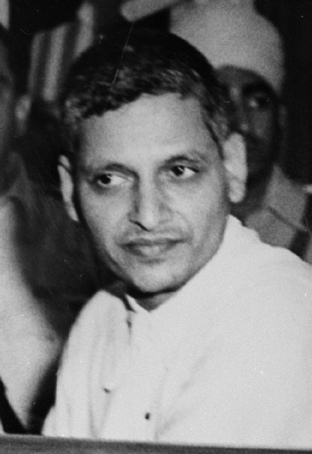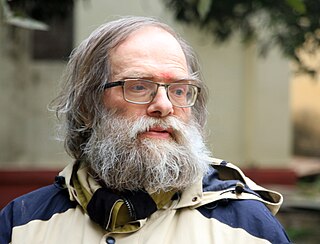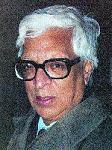Related Research Articles

Jawaharlal Nehru was an Indian anti-colonial nationalist, secular humanist, social democrat, author and statesman who was a central figure in India during the middle of the 20th century. Nehru was second only to Mahatma Gandhi in leading the Indian nationalist movement in the 1930s and 1940s. Upon India's independence from Britain in 1947, he served as the country's first prime minister for 16 years. Nehru championed parliamentary democracy, secularism, science and technology during the 1950s, influencing India's arc as a modern nation. In international affairs, he is well-known as one of the Founders of the Non-aligned Movement and, concomitantly, for steering India clear of the two blocs of the Cold War. A coveted author, the books he wrote in prison, such as Letters from a Father to His Daughter (1929), An Autobiography (1936) and The Discovery of India (1946), have been read and deliberated upon around the world.

Nathuram Vinayak Godse was the assassin of Mahatma Gandhi. He was a Hindu nationalist from Maharashtra who shot Gandhi in the chest three times at point blank range at a multi-faith prayer meeting in Birla House in New Delhi on 30 January 1948.
Hindutva is a political ideology encompassing the cultural justification of Hindu nationalism and the belief in establishing Hindu hegemony within India. The political ideology was formulated by Vinayak Damodar Savarkar in 1922. It is used by the Rashtriya Swayamsevak Sangh (RSS), the Vishva Hindu Parishad (VHP), the current ruling Bharatiya Janata Party (BJP), and other organisations, collectively called the Sangh Parivar.
The following outline is provided as an overview of and topical guide to Hinduism:

Arun Shourie is an Indian economist, journalist, author and politician. He has worked as an economist with the World Bank, a consultant to the Planning Commission of India, editor of the Indian Express and The Times of India and a Minister of Communications and Information Technology in the Vajpayee Ministry (1998–2004). He was awarded the Ramon Magsaysay Award in 1982 and the Padma Bhushan in 1990.

David Frawley, also known as Vamadeva Shastri, is an American Hindu writer, astrologer, acharya, ayurvedic practitioner, and Hindutva activist.

Subhash Kak is an Indian-American computer scientist and historical revisionist. He is the Regents Professor of Computer Science Department at Oklahoma State University–Stillwater, an honorary visiting professor of engineering at Jawaharlal Nehru University, and a member of the Indian Prime Minister's Science, Technology and Innovation Advisory Council (PM-STIAC).

Koenraad Elst is a Flemish author, known primarily for his adherence to the Hindutva ideology and support of the Out of India theory, which is regarded as pseudo-historical by mainstream scholarship. Scholars accuse him of harboring Islamophobia.

Romila Thapar is an Indian historian. Her principal area of study is ancient India, a field in which she is pre-eminent. Thapar is a Professor of Ancient History, Emerita, at the Jawaharlal Nehru University in Delhi.

Irfan Habib is an Indian historian of ancient and medieval India, following the methodology of Marxist historiography in his contributions to economic history. He is known for his strong stance against Hindutva and Islamic fundamentalism. He has authored a number of books, notably the Agrarian System of Mughal India, 1556–1707, an Atlas of the Mughal Empire: Political and Economic Maps with Detailed Notes, and an Atlas of Ancient Indian History. As the general editor, he is also the driving force behind the A People's History of India series, volumes of which continue to be released.

Aijaz Ahmad was an Indian-born American Marxist philosopher, literary theorist, and political commentator. He was the Chancellor's Professor at the University of California, Irvine School of Humanities’ Department of Comparative Literature.
Navaratna Srinivasa Rajaram was an Indian academic.He is notable for propounding the "Indigenous Aryans" hypothesis, asserting that the Vedic period was extremely advanced from a scientific view-point, and claiming of having deciphered the Indus script. Academics find his scholarship to be composed of dishonest polemics in service of a communal agenda.

Sarvepalli Gopal was a well-known Indian historian. He was the son of Sarvepalli Radhakrishnan, the first Vice-President and the second President of India. He was the author of the Radhakrishnan: A Biography and Jawaharlal Nehru: A Biography.
Hindus have found support for, or ideas foreshadowing evolutionary ideas, in scriptures, such as the mytheme of Dashavatara, the incarnations of Vishnu starting with a fish.
Voice of India (VOI) is a publishing house based in New Delhi, India, that specialises in Hindu nationalist books and serves as one of the most important tools in the development of Hindutva ideologies.
Biblia Impex India is a New Delhi–based book distribution company that specializes in books on Indology, Hinduism and Buddhism founded by the influential Indian historian Sita Ram Goel in 1963. It is currently managed by Goel's son Pradeep Kumar Goel.

Indian Institute of Science Education and Research, Mohali is an autonomous public research university established in 2007 at Mohali, Punjab, India. It is one of the seven Indian Institutes of Science Education and Research (IISERs), established by the Ministry of Human Resources and Development, Government of India, to research in frontier areas of science and to provide science education at the undergraduate and postgraduate level. It was established after IISER Pune and IISER Kolkata and is recognized as an Institute of National Importance by the Government of India. Institute focuses on pure research as well as interdisciplinary research in various fields of science.
Hindu nationalism has been collectively referred to as the expression of social and political thought, based on the native spiritual and cultural traditions of the Indian subcontinent. "Hindu nationalism" is a simplistic translation of Hindū Rāṣṭravād. It is better described as "Hindu polity".
Science and technology studies (STS) in India is a fast growing field of academic inquiry in India since the 1980s. STS has developed in the country from the science movements of the 1970s and 1980s as well as the scholarly criticism of science and technology policies of the Indian state. Now the field is established with at least five generations of scholars and several departments and institutes specialising in science, technology and innovation policy studies.

The historiography of India refers to the studies, sources, critical methods and interpretations used by scholars to develop a history of India.
References
- 1 2 Meera Nanda Profile Archived 29 June 2012 at the Wayback Machine Three Essays.
- ↑ Meera Nanda (2024). "A Field Guide to Post-Truth India." New Delhi, Three Essays Collective. ISBN 978-93-83968-44-2. (From the book jacket.)
- ↑ "Intolerance unplugged". Frontline. 28 September 2016. Retrieved 25 November 2023.
- ↑ "Meera Nanda – The Wire Science" . Retrieved 25 November 2023.
- ↑ "Committee for Skeptical Inquiry Elects Twelve New CSI Fellows". centerforinquiry.net. Center for Inquiry. 18 December 2023. Retrieved 21 December 2023.
- ↑ Reception of Darwinism in India (A talk by Professor Meera Nanda) Archived 10 February 2015 at the Wayback Machine , Indian Institute of Science
- ↑ "Mukto-Mona Writers' Corner - Meera Nanda". mukto-mona.com. Archived from the original on 25 October 2014. Retrieved 14 January 2010.
- ↑ Ranjit Hoskote (21 November 2006). "In defence of secularism". The Hindu . Archived from the original on 29 October 2013. Retrieved 14 January 2010.
- ↑ List of scholars invited to JNIAS Archived 16 July 2010 at the Wayback Machine JNIAS Jawaharlal Nehru University website.
- ↑ "IISER Pune". www.iiserpune.ac.in. Retrieved 16 April 2021.
- ↑ Ranjit Hoskote (3 May 2005). "Book Review: Paradigm shift". The Hindu . Archived from the original on 22 October 2012. Retrieved 14 January 2010.
- ↑ William Dalrymple (18 January 2010). "Review: The Glitter in The Godliness". Outlook . Retrieved 8 September 2013.
- ↑ "Books: A market for holy men: How globalization has had an impact on Hinduism and our public sphere". Mint. 21 August 2009.
- ↑ Nanda, Meera (16 September 2016), "Hindutva's science envy", Frontline, retrieved 14 October 2016